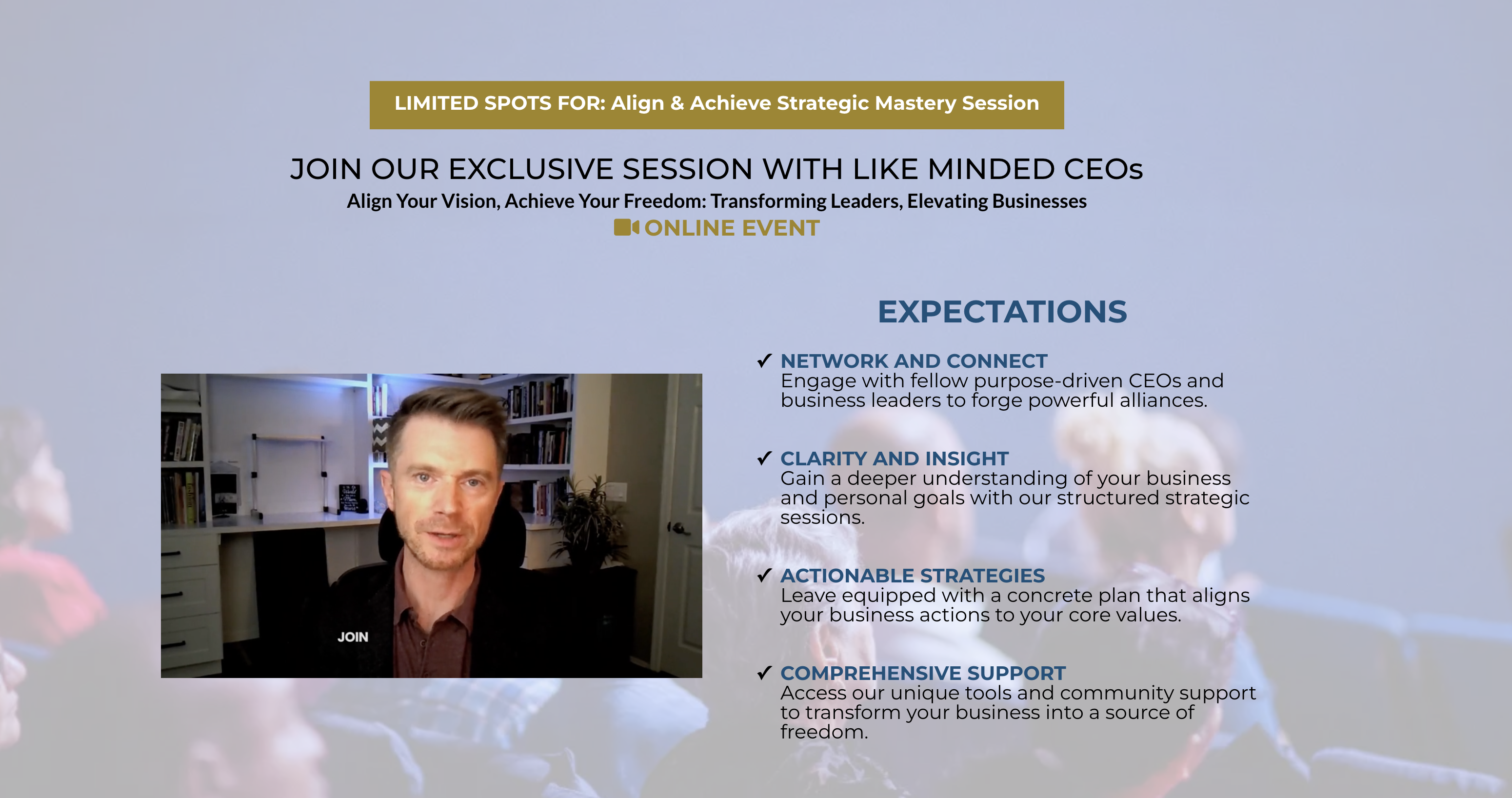Work Life Balance
25 Signals you may need to rethink some priorities
Looking for a High-Level Business Executive Mastermind?
Recognizing signs of an imbalanced work-life dynamic is crucial for maintaining healthy relationships with your children and spouse. Here are 25 red flags that may indicate your work life and home life are off balance:
Children’s Perspective
- Limited Interaction: You rarely spend quality time with your children.
- Missed Events: Frequently missing your children’s important events (games, recitals, parent-teacher meetings).
- Emotional Distance: Your children seem emotionally distant or hesitant to share their feelings with you.
- Behavioral Changes: Noticeable changes in your children’s behavior, such as acting out or becoming withdrawn.
- Increased Screen Time: Your children are spending more time on screens because you are not available to engage with them.
- Decline in School Performance: Their academic performance drops due to lack of parental support and involvement.
- Lack of Routine: Inconsistent routines for meals, bedtime, and homework due to your unpredictable schedule.
- Health Issues: Increased complaints of physical ailments (headaches, stomach aches) that may be stress-related.
- Decreased Bonding: Fewer shared activities like family dinners, outings, or game nights.
- Increased Anxiety: Your children show signs of anxiety or stress related to your absence.
- Lack of Communication: They express feeling unheard or neglected.
- Seeking Attention: They act out more often to get your attention.
- Dependency on Others: Relying more on friends, teachers, or other relatives for emotional support.
- Loss of Trust: They become more secretive or dishonest, feeling you are not available to understand their issues.
- Withdrawal from Activities: Losing interest in hobbies and activities they once enjoyed because they miss your involvement.
Spouse’s Perspective
- Infrequent Conversations: Lack of meaningful conversations with your spouse.
- Increased Arguments: More frequent disagreements or conflicts due to stress and lack of communication.
- Emotional Disconnection: Feeling emotionally disconnected from your spouse.
- Reduced Intimacy: A noticeable decrease in physical and emotional intimacy.
- Unresolved Issues: Leaving important issues unresolved because there’s no time to discuss them.
- Neglected Responsibilities: Your spouse feels burdened by taking on more responsibilities at home.
- Missed Plans: Frequently canceling plans or not being present for planned activities.
- Social Isolation: Less social interaction with friends and family as a couple.
- Health Decline: Your spouse experiencing stress-related health issues due to the imbalance.
- Resentment: Your spouse expresses resentment towards your job or work schedule.
- Feeling Unappreciated: Your spouse feels unappreciated or taken for granted.
- Financial Stress: Financial decisions and burdens are not being shared or discussed adequately.
- Increased Solo Activities: Your spouse engaging in more activities alone, indicating a gap in shared experiences.
- Avoidance: Avoidance behaviors such as going to bed early or late to avoid interaction.
- Reduced Patience: Decreased patience and tolerance for minor issues, indicating underlying stress.
Recognizing these signs can help you take proactive steps to restore balance and ensure the well-being of your family relationships.
Work Life Balance Mastermind
A work-life balance coach can be instrumental in helping married entrepreneurs with kids achieve a healthier and more sustainable balance between their professional and personal lives. Here’s how they can assist:
1. Identifying Priorities
- Clarifying Values and Goals: Helping you define what’s most important in both your business and family life.
- Setting Boundaries: Establishing clear boundaries between work and personal time to ensure neither is neglected.
2. Time Management
- Effective Scheduling: Assisting you in creating schedules that allocate sufficient time for work, family, and self-care.
- Delegation: Teaching you how to delegate tasks effectively at work and home to reduce your burden.
- Eliminating Time Wasters: Identifying and minimizing activities that consume time without adding value.
3. Stress Management
- Coping Strategies: Providing techniques to manage stress and prevent burnout.
- Mindfulness and Relaxation: Introducing practices like meditation, deep breathing, and mindfulness to enhance focus and reduce stress.
4. Communication Skills
- Improving Communication: Enhancing communication skills to ensure effective dialogue with your spouse and children about needs, expectations, and concerns.
- Conflict Resolution: Teaching conflict resolution strategies to handle disagreements constructively.
5. Building Support Systems
- Support Networks: Encouraging the creation of support networks both professionally and personally.
- Outsourcing and Assistance: Identifying areas where outsourcing (like hiring help for household tasks) can free up more personal time.
6. Personal Development
- Goal Setting: Helping you set and achieve personal goals alongside professional ones.
- Self-Care: Emphasizing the importance of self-care routines, including exercise, hobbies, and relaxation.
7. Family Involvement
- Involving Family in the Process: Encouraging family discussions about work-life balance to foster understanding and cooperation.
- Quality Family Time: Planning activities that ensure meaningful and quality time with family members.
8. Accountability
- Regular Check-Ins: Conducting regular sessions to track progress, adjust strategies, and ensure accountability.
- Feedback and Adjustments: Providing feedback on what’s working and what isn’t, and making necessary adjustments.
9. Work Efficiency
- Optimizing Work Processes: Helping streamline business operations to make them more efficient, freeing up time for personal life.
- Goal-Oriented Work: Ensuring work goals are clear and aligned with overall life goals.
10. Creating Balance in Roles
- Role Clarity: Defining your roles and responsibilities in both business and family contexts to avoid overlap and conflict.
- Transition Strategies: Developing strategies to smoothly transition between work and home roles, reducing the mental load.
Practical Steps a Work-Life Balance Coach Might Implement:
- Time Audits: Conducting time audits to understand how time is currently spent and identify areas for improvement.
- Weekly Planning Sessions: Facilitating weekly planning sessions to prioritize tasks and activities for the upcoming week.
- Boundary Setting Workshops: Conducting workshops on how to set and maintain boundaries effectively.
- Stress Reduction Techniques: Teaching and practicing stress reduction techniques in sessions.
- Family Meetings: Encouraging and guiding regular family meetings to discuss and plan for balanced living.
- Personal Development Plans: Creating personalized development plans that include professional and personal growth goals.
By addressing these areas, a work-life balance coach can help married entrepreneurs with kids create a more harmonious and fulfilling life, ensuring that both business ambitions and family needs are met without sacrificing one for the other.
Work Life Balance Speaker
Executive Business Growth and Personal Fulfillment Program
The Business Freedom Forum (BFF) is a transformative coaching program designed specifically for ambitious entrepreneurs who seek both significant business growth and personal fulfillment. At the heart of BFF is a commitment to not only enhance business performance but also improve the quality of life for its members. The forum utilizes innovative tools like the TriMetric Tracking System and the Alignment Operating System, which together provide a holistic approach to business and personal development. BFF focuses on diagnosing underlying business issues and leadership challenges, ensuring that solutions are not just effective but sustainable. Through a combination of personalized coaching, strategic planning, and peer support, members learn how to align their business operations with their personal values and life goals. This alignment helps them achieve a balance that fosters business success without sacrificing personal happiness.
Members of the Business Freedom Forum gain access to exclusive mastermind groups, expert-led workshops, and a supportive community that encourages growth, accountability, and transformation. BFF is ideal for business owners who are ready to step into a role of true leadership and wish to create businesses that not only thrive on their own but also contribute positively to their owners’ lives.
Monthly mastermind sessions are on Zoom. Plus, occasional special events in the Portland and Phoenix areas.
Mastermind Leader: Scott Landis Get Info
Scott Landis is an influential business coach and the visionary founder of Awakened Life, where he integrates profound personal development with strategic business growth. His coaching philosophy is rooted in the belief that true success comes from aligning one’s business endeavors with personal values and purpose. Through his flagship program, the Business Freedom Forum, Scott empowers entrepreneurs to not only scale their businesses effectively but also to enhance their overall quality of life. With a rich background in relationship intelligence and a deep understanding of business mechanics, Scott crafts bespoke solutions that address both the operational needs of a business and the personal development of its leader. His tools, including the innovative TriMetric Tracking System and Alignment Operating System, are designed to diagnose and resolve the complex challenges faced by business owners today. Scott is happily married to his high school sweetheart and best friend, Tawnya. They are raising their three children: Skyler, Allie, and Brynna in Gilbert, Arizona. His commitment extends beyond mere business success; he is dedicated to helping leaders achieve a sense of fulfillment and freedom that permeates all aspects of their lives. His approach fosters a balanced lifestyle that values health, relationships, and personal well-being, ensuring that entrepreneurs thrive in every area of their lives.
Business Freedom Forum







